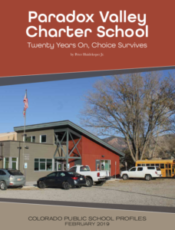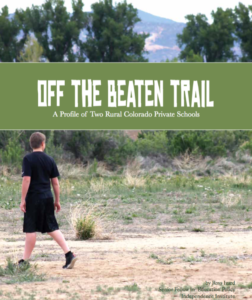New Publication About a Rural Charter Public School

In our latest profile of Colorado schools, author Peter Huidekoper Jr. paints a picture of how Paradox Valley Charter School serves as a successful place of learning for Pre K-12 students. The pride surrounding this small town school and the significant ties to the specific region are demonstrated through numerous interviews of Paradox Valley Charter School staff and community members.
Read More...
Rural Colorado Needs School Choice Too

Rural towns face unique difficulties and therefore require unique solutions in their communities, and education is no exception.
Read More...
Public Policy Buckets and the Law of Unintended Consequences
You know, we spend too much time thinking about public policy in buckets. I live in the education bucket, while others live in the finance bucket or the energy bucket or the transportation bucket or… well, you get the point. But the world doesn’t really work that way, does it? Public policy in one area often deeply affects policy in another. Pull the wrong string over here and you may inadvertently spark a crisis over there. To underscore that point, I’d like to call your attention to Exhibit A: South Routt School District (SOROCO to the locals) and the unintended consequences of the War on Coal on education in Colorado. South Routt is a tiny school district of about 350 PK-12 students near Steamboat. I’ll forgive you if you haven’t heard of it before. Like many rural school districts in Colorado, SOROCO lives on a budgetary razor’s edge where any large swing is likely to be felt very keenly. You can imagine the district’s panic, then, when Peabody Energy, the country’s largest coal-mining company, filed for Chapter 11 bankruptcy protection in April 2016. Why would a national coal company’s bankruptcy matter to South Routt? Because it turns out that bankrupt corporations […]
Read More...
State Board Tackles Not-So-Super Subgroups
Mondays are good days to roll up our sleeves and bury ourselves in education policy arcana. This Monday is a particularly good day to do that; on Wednesday, the Colorado State Board of Education will decide the fate of a complicated but important proposal related to our state’s school and district accountability system. The proposal deals with the use of “super subgroups” (also called “combined subgroups”), which aggregate subgroups of students—minority, at-risk, English-language learner (ELL), and special education—into a single bucket for accountability purposes under Colorado’s school and district performance frameworks (SPFs and DPFs). Pushed by some school districts, interest groups, and the Colorado Department of Education, the shift toward combined subgroups is strongly opposed by a large, diverse coalition of organizations from across the political spectrum. Careful observers will note that one of those organizations is the Independence Institute, which I happen to be rather fond of. Why is the Independence Institute involved? To understand that, you have to understand the issue in a little more detail. Brace yourself, thar be wonkery ahead.
Read More...
Binding Thread? Four-Day School Week Research & Denver's Roots Elementary
Sometimes a little edublogger sees two small interesting stories to cover, and leaves it to insightful readers like you to figure out the connection. Today is one of those somewhat interesting occasions. Let’s start over at Education Week, where a recent post by Liana Heitin caught my attention. A newly published study of 15 rural Colorado elementary schools show that changing the school week from five days to four brought about clear improvements in math and likely has the same sort of effect on reading. (It may even help student attendance, but those results weren’t definitive.) The average person’s reaction to such news might be a true head-scratcher. The research doesn’t provide any real insights into what causes this counterintuitive result. All these schools are still providing the required instructional hours, just packing them into longer days and extending the weekends. Some complementary research from Idaho released a couple months ago shows that making the shift to the shorter school week yields no savings, and in a few cases, actually incurs extra costs. Crazy, huh?
Read More...
Let Me Repeat Myself Once Again: Colorado Needs Course Choice
It has been said far more than once: “Repetition is the key to learning.” Given the number of times I’ve been told the importance of cleaning my room and eating my vegetables, my parents are firm believers in this statement. But hey, little Eddie gets it, too. Sometimes you have to make the same point over and over again — in new and creative ways, or just to new audiences. The lesson applies today to the subject of Course Access, or Course Choice. Back in 2012, my Education Policy Center friends published the paper “Online Course-Level Funding: Toward Colorado Secondary Self-Blended Learning Options.” The idea? Allow education funds to be unbundled so students can take a portion of the money to complete their learning path with their own selection of quality course providers. At the time Minnesota, and especially Utah, were the models for Colorado to study and follow in order to ensure a highly flexible and student-centered system of funding and delivering education. Many kids get all they need from their home secondary school — whether it’s traditional public, charter, or private; brick-and-mortar, online, or blended.
Read More...
Catching Up on Testing, Transparency, Accountability, Innovation… and More
If it seems like the middle of summer is a good time for me to catch up — well, that’s because it is. It took me a fairly long time to come down from my adrenaline rush that accompanied the high-stakes game of legislative testing chicken. Like any legislative compromise, the final version of House Bill 1323 signed into law certainly isn’t perfect. But overall it made some positive changes. Going forward, Colorado has maintained annual assessments but also streamlined the number and length of tests. The most underrated and underreported part of HB 1323 has to be the requirement that school districts “annually distribute to the parents of students…an assessment calendar.” The calendar is supposed to provide an estimate of annual testing times as well as which ones are required by the federal government, the state, or the district itself. Little Eddie loves transparency and helpful information for parents!
Read More...
Little Eddie Digs Out After the 2015 Legislative Session
The 2015 legislative session ended last week, and I have no doubt you are all eagerly awaiting a report on the progress made—or lack thereof. Luckily for you, I have been diligently digging through the aftermath of 2015’s education battles just as I help dad shovel snow after a big storm. With a whopping 119 education bills introduced, this is no easy task. The work is ongoing. But we can certainly pause to provide a quick overview of the session’s highlights. Fortunately, a discussion of actual legislative movement this year is relatively straightforward because very little noteworthy stuff passed at all. In fact, it’s fair to say that the single most important thing that happened this year was a compromise on the testing issue, which we discussed last week after observing a protracted and almost humorous (if it weren’t so serious) game of legislative testing chicken. As I predicted then, the compromise was amended before final passage. The bill currently awaits Governor Hicklenlooper’s signature. But we’ll cover the testing compromise in more depth later this week. For now, let’s talk other highlights. With lists! Because everyone loves lists!
Read More...
Charters Off the Beaten Path: A Different Kind of Roadtrip
This has been a good week. I got to write what I hope you thought was a funny April Fools’ Day post, and yesterday I had the pleasure of highlighting some exciting developments in what is quickly shaping up to be another year of school choice. The week before that, I talked about the awesome work urban charters are doing across the nation. But for all our talk of urban charters (which only makes sense given that most charters are in or around cities), we don’t often get to explore the world of rural charters. “Explore” doesn’t necessarily have to mean what nerds like me usually think it means. Sure, numbers and studies are great, but there’s something to be said for getting out and physically exploring charter schools off the beaten path. Maybe that’s why I was so interested by an edu-story today highlighting a special kind of road trip by some folks in Pagosa Springs.
Read More...
Harrison: More About Real Performance Pay than Former Presidents
What kind of a holiday is Presidents Day anyway? For many kids, it’s just a great excuse to stay home from school. Speaking of which, yours truly decided to dig up eight little factoids about Colorado public schools named after former U.S. presidents: Hardly a shock, “Lincoln” is the most popular presidential school name with 10 across the state. The most recent president so honored is John F. Kennedy, for which a Denver high school is named. Denver also has high schools named after George Washington and Thomas Jefferson, which come in as the next most popular choices. Colorado Springs 11 has a slew of elementary schools named after former presidents: James Madison, James Monroe, Andrew Jackson, Ulysses S. Grant, and Woodrow Wilson.
Read More...



